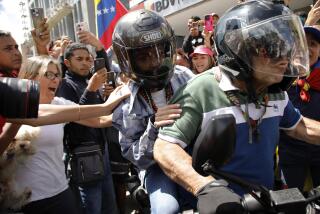El Salvador Starts Election Canvass : Duarte Control of Assembly Expected to Be Confirmed
- Share via
SAN SALVADOR — The official canvass of votes in El Salvador’s surprising March 31 elections for the National Assembly and municipal governments got under way Monday, the last of a series of developments that are changing the character of politics here.
The canvass began slowly, with the apparent losers--a right-wing coalition led by the Arena party--challenging the results in many areas.
Unofficially, according to the Christian Democrats’ tally of results last week, the Christian Democrats won at least 32 of the 60 seats in the assembly and about 200 of the 262 municipal contests. When the canvass is completed later in the week, these results are expected to be confirmed.
If so, President Jose Napoleon Duarte’s Christian Democrats will have control of the legislature for the first time since the current era of electoral politics began here in 1982 at the urging of the United States.
Because his party has never held an assembly majority, Duarte has been unable to advance his key programs, which include peace talks with leftist guerrillas battling his government in the countryside, promotion of human rights, judicial reform and strengthening of land reform.
If the Christian Democrats are confirmed to have an assembly majority, together with control of town halls across the country, they will have unprecedented political reach. In the past, their strength has been largely in the capital, San Salvador.
In spite of the apparent victory, there are still some roadblocks. For example, Duarte has interpreted the election as an endorsement of his effort to make peace with the guerrillas.
“I am going to open the dialogue with the elements under arms,” he said after his apparent victory.
The armed forces, though, have put limits on his bargaining room. Before peace talks were suspended after two meetings last autumn, the rebels demanded a role in government and a merger of the rebel fighters with the army. The military opposed both demands, and Duarte rejected them.
Political analysts here say that if the rebels drop these demands, it will be because of weakness in the field, not because of Duarte’s showing at the polls.
Human Rights Roadblocks
There are roadblocks, too, in the human rights area. It has been suggested that election results could clear the way for a proposal that a U.S.-trained team investigate a number of homicides at the hands of death squads and charges that civilians were slain by the military. The previous assembly refused to give the team investigative powers.
However, no major death squad case has been prosecuted since last May, when five National Guardsmen were convicted in the 1981 slaying of four American churchwomen. And because some of the outstanding cases involve high-ranking military officials and could implicate others, a spectacular breakthrough is unlikely.
Many political observers believe the most that can be expected as a result of the election is that some officers linked to criminal activity will be sent into exile.
Land reform, which is fundamental to the Christian Democrats’ economic policy, is stagnating. No new land is being distributed, and many existing cooperatives created under the reform program are heavily in debt.
Some analysts say better management, rather than legislation, is needed to make the cooperatives productive. It is not clear whether Duarte plans to make additional land available to landless farmers.
The most likely result of the elections is the emergence of the Christian Democratic Party as the dominant political force in El Salvador. With control of patronage, the Christian Democrats have an opportunity to attract new followers.
The military, previously an enemy of the Christian Democrats, appears to have made peace with the party. In 1972, the armed forces literally robbed Duarte of victory in a presidential election, beating him up and sending him into exile. Last week, the armed forces blocked an attempt by the right wing to nullify the apparent Christian Democratic victory.
Yet, military cooperation can also have its drawbacks. To retain the military’s support, it is widely believed, Duarte will have to continue to move slowly in talks with the guerrillas and in prosecuting human rights abuses.
As for the right wing, it will have to come to terms with a force that clearly is in power, for now. The Arena party is divided, and dissidents talk openly of trying to wrest control of the party from Roberto D’Aubuisson, a former army major who is the nation’s most visible extreme rightist.
It is also low tide for the rebel left, which is increasingly ineffective on the battlefield and now faces a consolidated administration with the clear support of the army.
More to Read
Sign up for Essential California
The most important California stories and recommendations in your inbox every morning.
You may occasionally receive promotional content from the Los Angeles Times.










